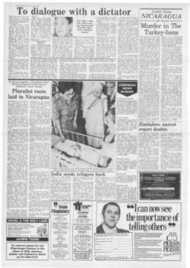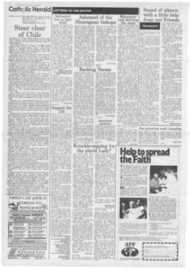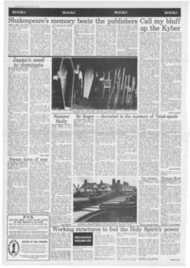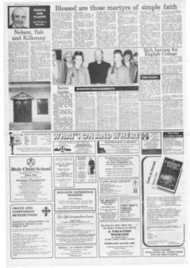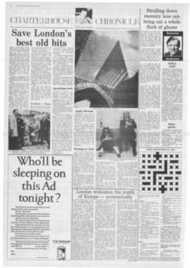Page 8, 16th January 1987
Page 8

Report an error
Noticed an error on this page?If you've noticed an error in this article please click here to report it.
Tags
Share
Related articles
Militant Conversion Cause For Ransomers
Bishops' Engagements
Bishops Engagements
Bishops Engagements'
Bishops Engagements'
Blessed are those martyrs of simple faith
1987 is the centenary year of the Guild of Our Lady of Ransom, and on Saturday November 28 on the eve of the centenary, there will be a Solemn Mass of Thanksgiving at Westminster Cathedral at 2.30pm.
Led by Cardinal Basil Hume OSB and Archbishop Barbarito, the Pro-Nuncio, the mass will be a concelebration by many bishops and priests from all over the country.
The current issue of "The Ransomer" has a splendid article on the 85 new Blessed Martyrs for '87. Of particular interest are the laymen martyrs who came from every walk of life.
William Carter was a London printer, condemned to death by hanging, drawing and quartering at Tyburn on January 11 1584 for printing Catholic books.
Marmaduke Bowes, of Ingram Grange, Yorkshire, was hanged at York on November 27 1585 for giving sanctuary to a priest.
Robert Bickerdike of Knaresborough in Yorkshire was condemned to be hanged, drawn and quartered at York on July 23 1586, for a "traitorous" speech.
Henry Webley, a Gloucester man, was hanged at Mill End Green on August 28 1589, for helping Blessed William Dean.
William Lampley, another Gloucester man, and a glover, was condemned to death in Gloucester for "persuading to popery" in 1588.
Richard Flower, of Anglesey was hanged at the age of 22 at Tyburn, on August 30 1588, for giving sanctuary to priests. Thomas Belson, of Brill, Buckinghamshire, was hanged at Oxford on July 5 1589, for assisting the martyrs Fr George Nichols and Fr Richard Yaxley.
Humphrey Pritchard, a welsh servant, was hanged at Oxford on July 5 for assisting Frs Nichols and Yaxley.
Robert Hardesty, a servant, was hanged at York on September 24 1589 for helping the martyr priest William Spenser.
Nicholas Horner, a tailor, born in Grantley in the West Riding of Yorkshire, was hanged at Smithfield on March 4, 1590, for assisting priests.
Alexander Blake, a London ostler, was hanged at Gray's Inn Lane in London on March 4 1590, for giving aid to priests.
Thomas Watkinson, a yeoman of Menthorpe in the East Riding of Yorkshire, was hanged in York on May 31 1591, for harbouring Fr Robert Thorpe.
William Pyke, a joiner, of Moors, near Christchurch, in Hampshire, was hanged in Dorchester on December 22 1591, for being reconciled to the church.
George Errington, a Northumberland man, who had been educated at Oxford, was hanged drawn and quartered at York on November 29 1596, for "persuading to popery".
William Knight, of the East Riding of Yorkshire, was also done to death in York on November 29 1596 for "persuading to popery".
William Gibson, born near Ripon, in the West Riding of Yorkshire, was hanged, drawn and quartered at York on November 29 1596, for "persuading to popery".
John Bretton, born near Wakefield in Yorkshire, a married man, was condemned to be hanged, drawn, and quartered at York on April 1 1598 for "treasonable language".
Ralph Grimston, of Nidd, near Knaresborough, in the West Riding of York, was condemned to be hanged at York on June 15 1598 for giving sanctuary to a priest.
John Norton of Durham, and John Talbot of Yorkshire, were both hanged at Durham, on August 1600, for giving sanctuary to priests.
Robert Grissold of Rowington, in WarwickstCre, was hanged at Warwick on uly 16 1604 for assisting priests.
Roger Wrenno, a weaver, from Chorley, was hanged at Lancaster on March 18 1616 for giving refuge to priests.
These laymen died because they believed that it was the mass that mattered, because they believed in the priesthood, and because they believed in the authority of St Peter's successors, rather than in the claims of Henry VIII, and Queen Elizabeth I, who personally signed and approved each of their sentences of death.
No amount of white-wash or fudging can get round the fact that the stark simple faith of these laymen, most of whom met the most barbaric of deaths, along with 63 martyr priests, helped to keep the Faith alive at a time when 'nry VIII and Elizabeth I t”ought that they had blotted it out for ever.
blog comments powered by Disqus



